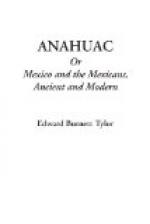Our road lies through a forest of pines and oaks, which reaches to the summit of the pass, where stands a wretched little village, La Guarda. There we had a thoroughly Mexican breakfast, with pulque in tall tumblers, and endless successions of tortillas, coming in hot and hot from the kitchen, where we could see brown women with bare arms, and black hair plaited in long tails, kneeling by the charcoal fire, and industriously patting out fresh supplies, and baking them rapidly on a hot plate. The piece de resistance was a stew, bright red with tomatas, and hot as fire with chile; and then came the frijoles—the black beans—without which no Mexican, high or low, considers a meal complete. The walls of the room were decorated with highly coloured engravings, one of which represented an engagement between a Spanish and an English fleet, in which the English ships are being boarded by the victorious Spaniards, or are being blown up in the background. Where the engagement was I cannot recollect. People in Mexico, to whom I mentioned this remarkable historical event, assured me that there are still to be seen pictures of the destruction of the English fleet by the French and Spaniards in the Bay of Trafalgar!
Mexico was always, until the establishment of the republic, profoundly ignorant of European affairs. In the old times, when the intercourse with the mother-country was by the great ship, “el nao,” which came once a year, the government at home could have just such news circulated through the country as seemed proper and convenient to them. We see in our own times how despotic governments can mystify their subjects, and distort contemporary history into what shape they please. But in Spanish America the system was worked to a greater extent than in any other country I have heard of; and the undercurrent of popular talk, which spreads in France and Russia things and opinions not to be found in the newspapers, had in Mexico but little influence. Scarcely any Mexican travelled, scarcely any foreigner visited the country, and the Spaniards who came to hold offices and make fortunes were all in the interest of the old country; so the Mexicans went on, until the beginning of this century, believing that Spain still occupied the same position among the nations of Europe that it had held in the days of Charles the Fifth.
While my companion was outside the Diligence, Don Guillermo and I were left to the conversation of an Italian fellow-passenger. One finds such characters in books, but never before or since have I seen the reality. He might have been the original of the great Braggadoccio. His conversation was like a chapter out of the autobiography of his countryman Alfieri.
He had accompanied the Italian nobleman who was killed in an affray with the Mexican robbers, some years ago, and on that occasion his defence had been most heroic. He himself had shot several of the robbers; till at last, his friend being killed, the rest of the party yielded to the overwhelming numbers of the brigands, and he ran off to fetch assistance!




